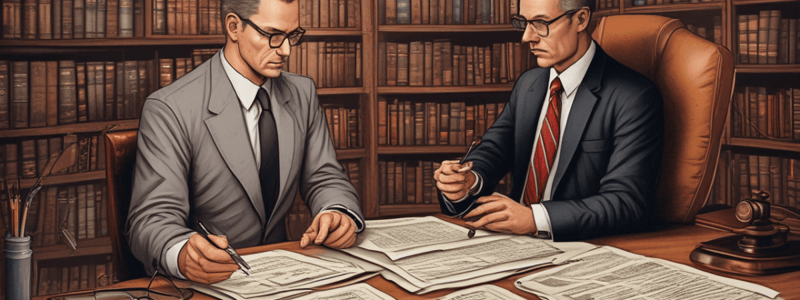Podcast
Questions and Answers
What is the primary purpose of an investigation?
What is the primary purpose of an investigation?
- To gather evidence for a trial
- To write a detailed report of the incident
- To identify and apprehend the person(s) inspected of violating the laws of the state and the community (correct)
- To prove the suspect's guilt in a court of law
When should preparation for trial begin?
When should preparation for trial begin?
- When the officer receives the radio call that results in the arrest (correct)
- When the investigation is complete
- When the suspect is taken into custody
- When the officer arrives at the crime scene
What is the main goal of a trial?
What is the main goal of a trial?
- To prove the suspect's innocence
- To determine whether or not the individual being tried did in fact commit the offenses as charged (correct)
- To sentence the suspect to the maximum punishment
- To dismiss the case due to lack of evidence
What is the importance of proper courtroom demeanor?
What is the importance of proper courtroom demeanor?
Why is every call handled anticipating eventual court testimony?
Why is every call handled anticipating eventual court testimony?
What is the scope of the section on criminal investigation?
What is the scope of the section on criminal investigation?
What should you avoid doing when addressing the defendant or their attorney?
What should you avoid doing when addressing the defendant or their attorney?
What is the primary purpose of reviewing the report before testifying?
What is the primary purpose of reviewing the report before testifying?
Why is it important to identify your physical evidence in court?
Why is it important to identify your physical evidence in court?
What is a common mistake that can lead to failure as a witness?
What is a common mistake that can lead to failure as a witness?
What is the purpose of the courtroom observation requirement for recruits?
What is the purpose of the courtroom observation requirement for recruits?
Why is it important to respond to harsh cross-examination with firmness and politeness?
Why is it important to respond to harsh cross-examination with firmness and politeness?
When should preparation for trial begin?
When should preparation for trial begin?
What is an important step in conducting a good preliminary investigation?
What is an important step in conducting a good preliminary investigation?
Why is it important to properly preserve evidence?
Why is it important to properly preserve evidence?
What should you do before the trial date?
What should you do before the trial date?
What is a key aspect of courtroom demeanor?
What is a key aspect of courtroom demeanor?
Why is it crucial to speak the truth on the witness stand?
Why is it crucial to speak the truth on the witness stand?
What should you do when unable to remember something on the witness stand?
What should you do when unable to remember something on the witness stand?
What should you avoid doing during cross-examination?
What should you avoid doing during cross-examination?
What is the purpose of conducting a thorough preliminary investigation?
What is the purpose of conducting a thorough preliminary investigation?
Why is it important to review photographs of the defendant?
Why is it important to review photographs of the defendant?
Study Notes
Case and Trial Preparation
- Preparation for trial begins when an officer receives a radio call, and every call should be handled anticipating eventual court testimony.
- Proper preparation for trial is synonymous with proper case preparation, which starts at the initial stages of an investigation.
Preparation Steps Prior to Trial
- Conduct a good preliminary investigation, including taking detailed and complete notes, collecting and preserving evidence, and documenting spontaneous statements and witness statements.
- At the police station, interview witnesses, complete and preserve notes, and write a clear and concise report.
- Before the trial date, refresh your memory from the police report and personal notes, check evidence, and discuss the case with the prosecutor.
Courtroom Demeanor
- Be on time, as tardiness can lead to case dismissal, and be neat and conservative in appearance.
- Conduct yourself in a professional manner, maintaining good eye contact and speaking clearly and distinctly.
- On the witness stand:
- Sit erect and comfortable, without slouching.
- Direct your attention to the person asking the questions and maintain good eye contact.
- Speak clearly and distinctly, and pause before answering.
Successful Witness Guidelines
- Review the facts in the case before testifying, and confer with the prosecutor before trial.
- Be honest and tell the truth, even if it's not pleasant, and do not volunteer information or express opinions unless requested.
- Identify physical evidence, and be able to explain it in court.
- Respond to harsh cross-examination with firmness and politeness.
Common Causes of Failure as a Witness
- Poor attitude, feeling superior to everyone in the courtroom.
- Poor preparation, including writing a bad report, and lacking professionalism throughout the investigation and courtroom process.
- Poor appearance, conveying a negative image to the judge, jury, and onlookers.
Studying That Suits You
Use AI to generate personalized quizzes and flashcards to suit your learning preferences.
Description
Learn about proper case preparation and courtroom demeanor, including preparation steps and tips for being a successful witness. This lesson covers key objectives for effective trial preparation.




